Intel NUC5i7RYH Broadwell-U Iris NUC Review
by Ganesh T S on April 20, 2015 8:00 AM EST- Posted in
- Systems
- Intel
- HTPC
- NUC
- Broadwell-U
Networking and Storage Performance
We have recently started devoting a separate section to analyze the storage and networking credentials of the units under review. On the storage side, one option would be repetition of our strenuous SSD review tests on the drive(s) in the PC. Fortunately, to avoid that overkill, PCMark 8 has a storage bench where certain common workloads such as loading games and document processing are replayed on the target drive. Results are presented in two forms, one being a benchmark number and the other, a bandwidth figure. We ran the PCMark 8 storage bench on selected PCs and the results are presented below.
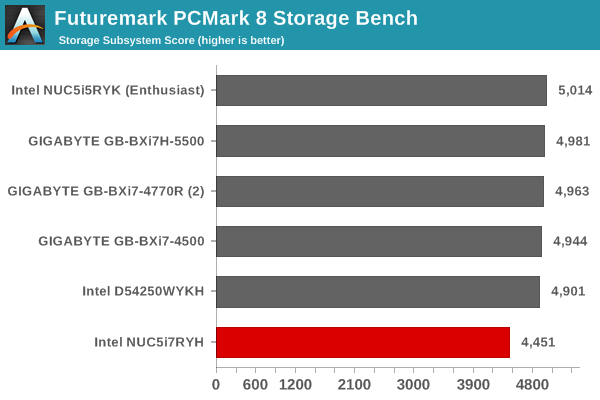
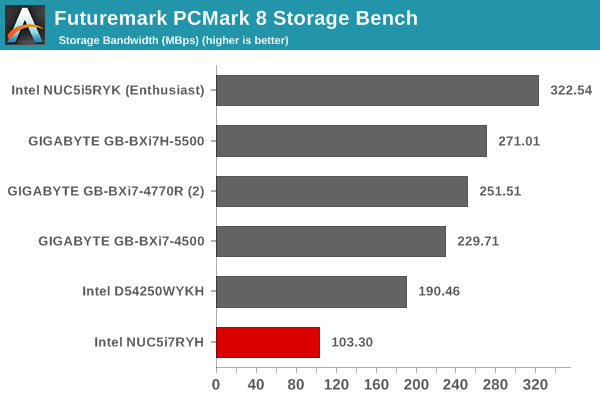
The MZVPV256 is the first NVMe SSD in the M.2 form factor. Given its PCIe 2.0 x4 link (the controller supports PCIe 3.0, but the unit connects to the PCIe 2.0 lanes in the Broadwell-U package) and the advantages of NVMe over AHCI, we expected our configuration to lead the storage charts. Our unexpected results made us run a couple of other artificial benchmarks (reproduced below).
The results from ATTO and CrystalDiskMark matches the specifications (accounting for the downgrade of the host link from PCIe 3.0 to PCIe 2.0). After discussion with Samsung, it turned out that the performance difference was due to the Microsoft NVMe driver creating FUA (Force Unit Access) I/O write commands. These FUA commands bypass the DRAM cache on the SSD and directly write to the flash, increasing the response time and also lowering bandwidth. For the same access traces, this situation does not happen with the Microsoft AHCI driver.
We observed something similar with the Intel SSD P3700 NVMe PCIe drive. With the Microsoft NVMe driver, the benchmark reported storage bandwidth around 320 MBps, while the Intel NVMe driver bumped that upwards of 500 MBps. So, we can conclude with a high degree of confidence that the Microsoft NVMe driver needs some fixes.
On the networking side, we restricted ourselves to the evaluation of the WLAN component. Our standard test router is the Netgear R7000 Nighthawk configured with both 2.4 GHz and 5 GHz networks. The router is placed approximately 20 ft. away, separated by a drywall (as in a typical US building). A wired client (Zotac ID89-Plus) is connected to the R7000 and serves as one endpoint for iPerf evaluation. The PC under test is made to connect to either the 5 GHz (preferred) or 2.4 GHz SSID and iPerf tests are conducted for both TCP and UDP transfers. It is ensured that the PC under test is the only wireless client for the Netgear R7000. We evaluate total throughput for up to 32 simultaneous TCP connections using iPerf and present the highest number in the graph below.
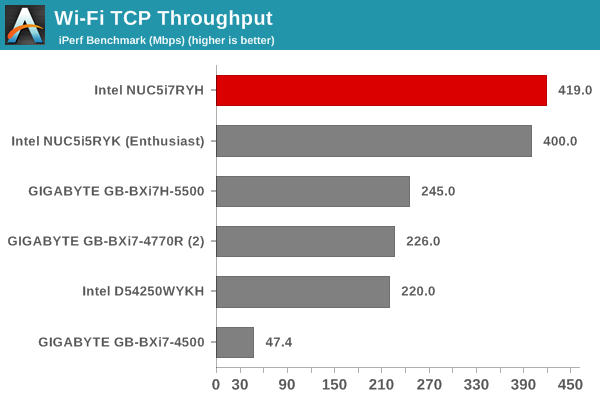
In the UDP case, we try to transfer data at the highest rate possible for which we get less than 1% packet loss.
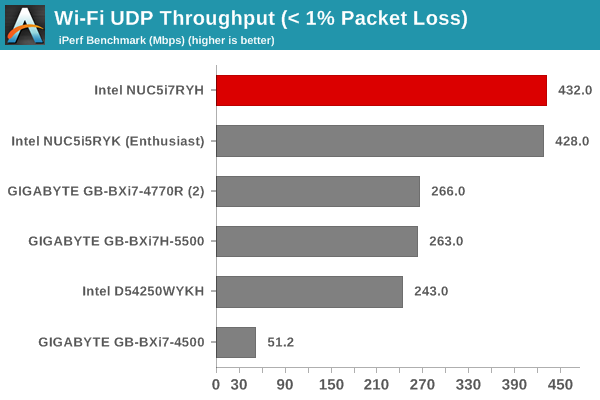
Recent driver updates have enabled the Intel AC726x solutions to perform up to their advertised potential. Users facing issues with them are urged to update their drivers as well as router firmware in order to take advantage of the capabilities. The Broadwell-U NUC (NUC5i5RYK) uses the same Intel AC-7265 2x2 802.11ac soldered M.2 Wi-Fi card as the NUC5i7RYH. So, it is not surprising that the TCP and UDP throughputs are similar for the two systems.


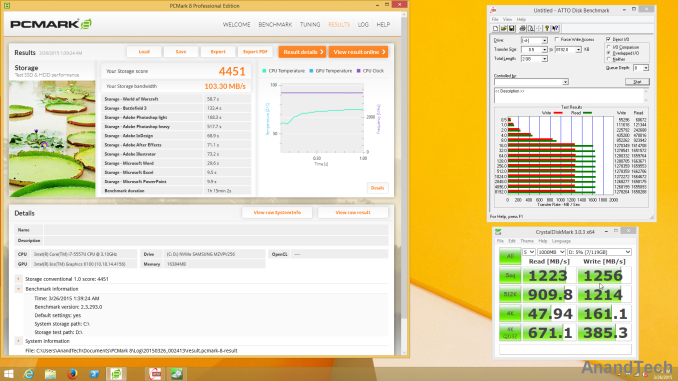








66 Comments
View All Comments
damianrobertjones - Monday, April 20, 2015 - link
I have the i5 version along with an 850 evo drive and, seeing as it's there, a Plextor M6e M.2 PCIe drive. The Nuc is quite fast but when it comes to using the Plextor PCIe SSD, while running VMs etc, the performance is really quite poor. We're talking the same speed or less than the 850 drive. (Stats obtained from the Samsung Magician software)Heck using video from within a VMWare OS, along with Corel Videostudio, creates stuttering etc. Previously I did the same task with a Surface Pro 3 (i7,8GB) with no such issues.
Is the M.2. spec simply not ready?
CaedenV - Monday, April 20, 2015 - link
That depends a lot on your software and hardware support. For example, before I was running win10 bare metal on my desktop I was running it in VM, and on my nice big Sandy Bridge i7 desktop it could not play back simple h.264 1080p video smoothly... but trying the same thing on my newer but much more gutless i7 dual core laptop a few months later had pretty much 0 issues. It all depends on the VM platform, the OSs in use, the GPU, the drivers, etc.damianrobertjones - Monday, April 20, 2015 - link
I hear you. I just expected more from the PCIe M.2. drive. It simply 'feels' slow and the speed test returns figures that are nowhere near the performance that it should hitFlunk - Monday, April 20, 2015 - link
It might have to do with the controller.extide - Thursday, April 23, 2015 - link
You'r VMDK's are probably not properly 4K aligned.extide - Thursday, April 23, 2015 - link
Your*damianrobertjones - Friday, April 24, 2015 - link
I've moved to an MSI machine with 2x 850 evos. Problem solved and all working fine again.smegma11 - Tuesday, October 13, 2015 - link
I read somewhere to expect great things from the Skylake. The newest chip will open up all 3 data lines to the M.2 where the previous versions don't. I imagine this will help speeds quite a bit.nutternatter34 - Monday, April 20, 2015 - link
I have to agree. I tried to use an M.2 as a boot drive and for my software. Where I might not be able to compare many SSDs in general usage, the M.2 directly hampered multi-tasking and had notable visible performance issues. Maybe I expected too much from it but in future I would be very cautious choosing an M.2 drive over something in the 2.5" form factor.damianrobertjones - Tuesday, April 21, 2015 - link
THANK YOU! Glad that someone's got the same issue.From the Samsung Magician software
Samsung 850 EVO 250GB 2.5"
SR: 547 SW: 504
RR: 71807 RW: 64081
Plextor PX-G128M6e
SR: 743 SW: 332
RR: 64558 RW: 47909
The whole reason for getting one was to have improved performance for my VMs! What's going on? (Not tried to update the Plextor firmware just yet)